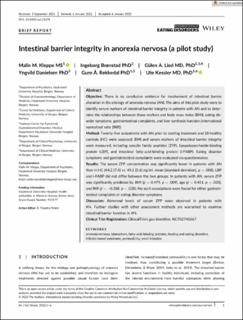Intestinal barrier integrity in anorexia nervosa (a pilot study)
Kleppe, Malin M.; Brønstad, Ingeborg; Lied, Gülen Arslan; Danielsen, Yngvild Sørebø; Rekkedal, Guro Årdal; Kessler, Ute
Journal article, Peer reviewed
Published version

Åpne
Permanent lenke
https://hdl.handle.net/11250/2993212Utgivelsesdato
2022Metadata
Vis full innførselSamlinger
- Department of Clinical Medicine [2095]
- Registrations from Cristin [10406]
Sammendrag
Objective
There is no conclusive evidence for involvement of intestinal barrier alteration in the etiology of anorexia nervosa (AN). The aims of this pilot study were to identify serum markers of intestinal barrier integrity in patients with AN and to determine the relationships between those markers and body mass index (BMI), eating disorder symptoms, gastrointestinal complaints, and liver synthesis function (international normalized ratio [INR]).
Method
Twenty-five outpatients with AN prior to starting treatment and 28 healthy controls (HC) were assessed. BMI and serum markers of intestinal barrier integrity were measured, including zonulin family peptides (ZFP), lipopolysaccharide-binding protein (LBP), and intestinal fatty-acid-binding protein (i-FABP). Eating disorder symptoms and gastrointestinal complaints were evaluated via questionnaires.
Results
The serum ZFP concentration was significantly lower in patients with AN than in HC (44.2 [7.4] vs. 49.2 [5.6] ng/ml, mean [standard deviation], p = .008). LBP and i-FABP did not differ between the two groups. In patients with AN, serum ZFP was significantly predicted by BMI (β = 0.479, p = .009), age (β = 0.411, p = .020), and INR (β = −0.388, p = .028). No such associations were found for either gastrointestinal complaints or eating disorder symptoms.
Discussion
Abnormal levels of serum ZFP were observed in patients with AN. Further studies with other assessment methods are warranted to examine intestinal barrier function in AN.
